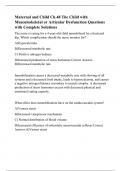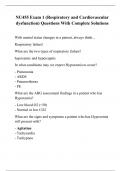Dysfuncti - Study guides, Class notes & Summaries
Looking for the best study guides, study notes and summaries about Dysfuncti? On this page you'll find 765 study documents about Dysfuncti.
Page 2 out of 765 results
Sort by
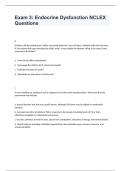
-
Exam 3: Endocrine Dysfunction NCLEX Questions correctly answered
- Exam (elaborations) • 49 pages • 2024
- Available in package deal
-
- $19.99
- + learn more
Exam 3: Endocrine Dysfunction NCLEX Questionsb A father calls the pediatrician's office concerned about his 5 year old type 1 diabetic child who has been ill. He reports that upon checking the child's urine, it was positive for ketones. What is the nurse's best response to the father? a. "come to the office immediately" b. "encourage the child to drink calorie-free liquids" c. "hold the next dose of insulin" d. "administer an extra dose of insulin now" c A nurse working o...
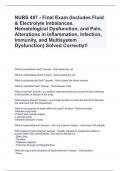
-
NURS 487 - Final Exam (Includes Fluid & Electrolyte Imbalances, Hematological Dysfunction, and Pain, Alterations in Inflammation, Infection, Immunity, and Multisystem Dysfunction) Solved Correctly!!
- Exam (elaborations) • 15 pages • 2024
-
- $13.99
- + learn more
NURS 487 - Final Exam (Includes Fluid & Electrolyte Imbalances, Hematological Dysfunction, and Pain, Alterations in Inflammation, Infection, Immunity, and Multisystem Dysfunction) Solved Correctly!!
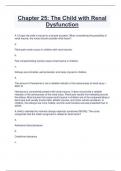
-
Chapter 25: The Child with Renal Dysfunction
- Exam (elaborations) • 34 pages • 2024
- Available in package deal
-
- $7.99
- + learn more
A 12-year-old child is injured in a bicycle accident. When considering the possibility of renal trauma, the nurse should consider what factor? a. Flank pain rarely occurs in children with renal injuries. b. Few nonpenetrating injuries cause renal trauma in children. c. Kidneys are immobile, well protected, and rarely injured in children. d. The amount of hematuria is not a reliable indicator of the seriousness of renal injury. - ANS: D Hematuria is consistently present with renal tra...
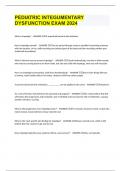
-
PEDIATRIC INTEGUMENTARY DYSFUNCTION EXAM 2024
- Exam (elaborations) • 9 pages • 2024
-
- $15.49
- + learn more
PEDIATRIC INTEGUMENTARY DYSFUNCTION EXAM 2024 What is impetigo? - ANSWER ☑☑A superficial bacterial skin infection How is impetigo spread? - ANSWER ☑☑Can be spread through contact, possibly by touching someone with the bacteria, or by a child touching one infected part of the body and then touching another part (called self-inoculation) What is the best way to prevent impetigo? - ANSWER ☑☑Good handwashing, not only of other people who may be carrying bacteria on their ha...
Maternal and Child Ch.48 The Child with Musculoskeletal or Articular Dysfunction Questions with Complete Solutions
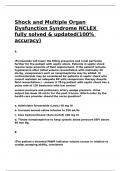
-
Shock and Multiple Organ Dysfunction Syndrome NCLEX fully solved & updated(100% accuracy)
- Exam (elaborations) • 32 pages • 2024
-
- $13.49
- + learn more
A (Furosemide will lower the filling pressures and renal perfusion further for the patient with septic shock. Patients in septic shock require large amounts of fluid replacement. If the patient remains hypotensive after initial volume resuscitation with minimally 30 mL/kg, vasopressors such as norepinephrine may be added. IV corticosteroids may be considered for patients in septic shock who cannot maintain an adequate BP with vasopressor therapy despite fluid resuscitation.) A 78-kg patient ...
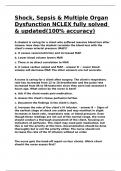
-
Shock, Sepsis & Multiple Organ Dysfunction NCLEX fully solved & updated(100% accuracy)
- Exam (elaborations) • 32 pages • 2024
-
- $14.49
- + learn more
A student is caring for a client who suffered massive blood loss after trauma. How does the student correlate the blood loss with the client's mean arterial pressure (MAP)? a. It causes vasoconstriction and increased MAP. b. Lower blood volume lowers MAP. c. There is no direct correlation to MAP. d. It raises cardiac output and MAP. B ~ Lower blood volume will decrease MAP. The other answers are not accurate. A nurse is caring for a client after surgery. The client's respiratory ra...
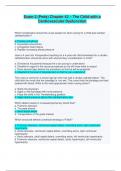
-
Exam 2 (Peds) Chapter 42 – The Child with a Cardiovascular Dysfunction | With Verified Answers
- Exam (elaborations) • 18 pages • 2024
-
- $19.99
- + learn more
Exam 2 (Peds) Chapter 42 – The Child with a Cardiovascular Dysfunction | With Verified Answers Which complication should the nurse assess for when caring for a child post cardiac catheterization? a. Cardiac arrhythmia b. Hypostatic pneumonia c. Congestive heart failure d. Rapidly increasing blood pressure Jose is 4 year old. Preoperative teaching for a 4-year-old child scheduled for a cardiac catheterization should be done with what primary consideration in mind? a. Directed at his parents b...
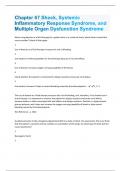
-
Chapter 67 Shock, Systemic Inflammatory Response Syndrome, and Multiple Organ Dysfunction Syndrome Exam Questions With 100% Correct Answers
- Exam (elaborations) • 37 pages • 2024
-
- $8.39
- + learn more
When using dextran as a fluid therapy for a patient who is in a state of shock, which factors should the nurse consider? Select all that apply. 1 Use of dextran as a fluid therapy increases the risk of bleeding. 2 Use dextran in limited quantities for shock therapy because it has side effects. 3 Use of dextran increases oxygen-carrying capability of the blood. 4 Check whether the patient is monitored for allergic reactions and acute renal failure. 5 Use dextran, because it helps to co...
NU455 Exam 1 (Respiratory and Cardiovascular dysfunction) Questions With Complete Solutions

$6.50 for your textbook summary multiplied by 100 fellow students... Do the math: that's a lot of money! Don't be a thief of your own wallet and start uploading yours now. Discover all about earning on Stuvia

